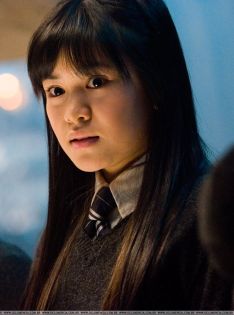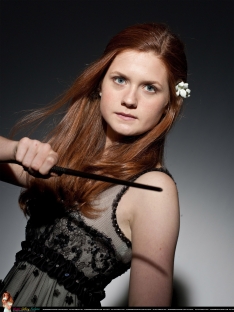How often do you cry?
Myself, I cry a lot. If I feel sad, I cry. If I feel frustrated, I often vent a little to a close friend and might get teary in the process. I have found that I don’t really feel worse after I cry, but I do feel quite terrible in the moments leading up to the cathartic weeping session, so I prefer to just cut to the chase and play fast and loose with my lachrymal glands.
I know some people find this odd, my friends included. Also, given the prevailing tone of the Potter books, I’m pretty sure it would have meant that Harry would never have dated me.
 I realized this when I was re-reading The Order of the Phoenix a couple of months ago: weeping is not seen as a very constructive or even therapeutic act in the Potter books especially when it’s being done by women. Perhaps this has a lot to do with the fact that the books are told, by and large, from the perspective of an adolescent boy who is (like many adolescent boys in literature) ‘uncomfortable’ in the presence of a weeping woman.
I realized this when I was re-reading The Order of the Phoenix a couple of months ago: weeping is not seen as a very constructive or even therapeutic act in the Potter books especially when it’s being done by women. Perhaps this has a lot to do with the fact that the books are told, by and large, from the perspective of an adolescent boy who is (like many adolescent boys in literature) ‘uncomfortable’ in the presence of a weeping woman.
Consider Cho Chang. Here’s a sixteen year old girl who lost her boyfriend in an extremely traumatizing manner and (maybe unwisely) took a call to move on and date the person who saw him die. Cho is popular, sporty and very pretty, but whenever shes with Harry, she inevitably breaks into tears and acts, as he puts it, like a ‘human hosepipe’. Hermione’s attempt to explain Cho’s conflicted emotions impresses Harry and Ron (‘no one could feel all that at once, they’d explode’), but does it really lead to any increased sense of empathy for Cho?
It might be too optimistic to expect Harry to understand Cho’s viewpoint—after all, he is only fifteen years old and rather wrapped up in the larger issue of dealing with Voldemort’s return. In itself, his inability to be supportive is not a terrible thing, it’s hardly the biggest problem in the series, but when Cho’s weepiness is contrasted strongly with Ginny Weasley’s behaviour, Harry’s lack of supportiveness becomes much more problematic.
In Deathly Hallows , Harry and Ginny have a ‘moment’ on his 17th birthday. Despite the fact that she knows Harry and his friends are going off on a dangerous mission, Ginny does not press for details, nor does she betray (except for one moment of pale-faced shock) any sadness or worry at the prospect. Harry reflects on this during their brief encounter in her sunny bedroom: ‘…that was one of the things he liked about her, she was very rarely weepy’.
Ginny does not cry, not usually. She’s been ‘toughened’ by living with six brothers, rarely succumbing to the weakness of tears. The one time she cries on-screen after her emergence as a bright, focused character in Order of the Phoenix is at this point in Hallows , when her birthday surprise for Harry is ruined by the ‘pointed’ entrance of Ron and Hermione. Then she ‘succumbs’ ‘for once’ to tears.
It is noteworthy that, even at this point, she turns away to cry, sparing Harry the sight.
Ginny’s ‘toughness’ is contrasted strongly to Cho’s hosepipe-like behaviour at the close of Phoenix when the six Ministry survivors sit around discussing the Ravenclaw-Gryffindor Quidditch match. Ginny snags the Snitch from ‘right under’ Cho’s nose; Harry asks what Cho did in response, enquiring (rather nastily) whether she burst into tears. As it turns out, she did throw a bit of a tantrum, casting her broom aside and rushing off to be comforted by Ginny’s onetime boyfriend, Michael Corner. This hissy fit neatly ties up the straggling ends of both Harry and Ginny’s drama-soaked love lives in Phoenix, leaving Harry free to move on to the tougher girl. Of course, Ginny dallies for a bit before she gives him the satisfaction of being with her.
Ginny is an odd blend, feminine without being ‘girly’, understanding without words Harry’s need for unquestioned support and being just tough enough to be a love interest who doesn’t sap at his attention. She seems, in some respects, impossible to emulate; I can’t imagine being half so mature at the age of sixteen – indeed, even Hermione has more moments of emotional weakness than Ginny does. She has the ability to be one of the ‘boys’ in a manner that Hermione does not, chiefly because of her interest in and skills on the Quidditch pitch. I think Rowling gave her the strengths of many of the other leading female characters in the series: the more typical high-school success traits of attractiveness and popularity that define Cho, the spunk and independence of Luna and the impressive insight into other people that Hermione betrays time and again. Take all these ingredients and mix them up, and you’ve got Harry’s ideal partner.
Ginny is pure nerve, unlike her rival. Cho seems to run on emotion and impulse, rarely appearing to filter what she feels or says once she’s let her guard down and shown her feelings for Harry. Ginny, despite the overwhelming trials she faces, never once breaks down except, for a couple of moments, in the privacy of her bedroom.
Maybe this is why it took me so very long to warm up to Ginny. She seems sort of unbelievably perfect, a shining ideal that not all of us, least of all me, could hope to emulate. Cho, on the other hand, is much more easily accessible, more ‘human’ in some ways. She certainly seems closer to the everyday teenage girl than strong and perfect Ginny.
I would like to think, however, that Ginny made Harry work a little in the years after the war, and wasn’t too perfect. Perhaps he even learned how to deal with crying women once he was done ‘hunting Voldemort’. There’s no doubt that the boy needed time to do his own growing up; one can only hope that Ginny didn’t make that ride too easy for him, as he didn’t make it easy for anyone else.
Wonderful evaluation between these two women in Harry’s young life… I do agree with you that Cho first was a bit too weepy for my likings, but with your evaluation, it all makes sense 🙂
Thank you! 🙂 I thought the book was a little unkind to Cho, and she needn’t some support!
Thank you for your post. It is well written, and a great take on Ginny and Cho that I hadn’t considered before. I think you really naked why it was so hard to warm up to Ginny but, also why, at the same time, she was perfect for Harry.
~Aspen
Thank you!
I’m the same as you, I cry too easily… but being emotional is not really weakness like how Cho portrays it. It just means you’re more incline to feel even in the smallest situations.
I don’t think it’s a weakness at all–it’s just how some of us are made. The contrast between Cho and Ginny on this basis is a little disturbing though.